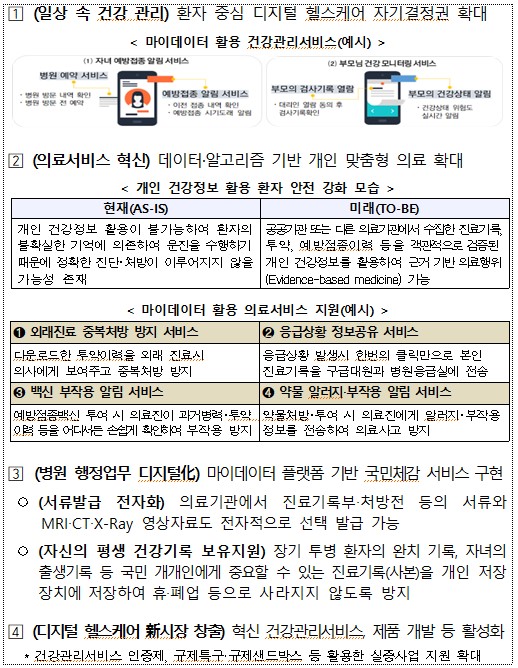– The 1st Health and Medical Data Policy Review Committee held (6.27.) –
– Rapidly promote national tasks such as medical my data, digital healthcare, and big data opening –
□ The Ministry of Health & Welfare announced that it would hold the first 'Health and Medical Data Policy Deliberation Committee' at the Korea Chamber of Commerce and Industry in Seoul on June 6 (Mon) at 27:14.
○ The 'Health and Medical Data Policy Review Committee' is a committee formed to discuss major decision-making matters regarding medical information and health data policy implementation.
– With the 2nd Vice Minister of Health & Welfare as the chairperson, the director of the Health Industry Policy Bureau in charge of bio and digital health policies and 20 people representing each field* were appointed as members.
* Medical field, research field, academia, law·ethics field, patient·employee group, health industry, public institution
– Through this committee, social consensus is formed on the health and medical data policy promoted by the government, and major policy directions are decided based on trust.
□ This meeting was the first meeting after the formation of the Health and Medical Data Policy Deliberation Committee for the first period ('1~'22.6).
○ Chaired by Lee Ki-il, 2nd Vice Minister of Health & Welfare, ▴Digital Healthcare Policy Direction, ▴Clinical Data Network (K-CURE*) Project Promotion Plan, and ▴Medical MyData Policy Direction were discussed.
* Korea-Clinical data Utilization network for Research Excellence: Connect and open patient-centered information distributed in medical data-oriented hospitals and public institutions
□ The main contents discussed in this committee are as follows.
< Digital healthcare policy direction >
□ With the advent of the era of the 4th industrial revolution, the medical service paradigm is shifting from provider/treatment-centered to patient/prevention-centered.
< Medical service paradigm shift >

○ Major advanced countries have already reorganized laws and systems* to promote digital health care and preemptively established a national 'digital health innovation strategy'.
* (US) 21st century therapy, (Japan) Next-generation medical infrastructure law, (獨) Digital Healthcare Promotion Act (DVG), etc.
○ In Korea, it is necessary to actively respond to social problems such as aging population through the promotion of digital health care promotion policies and to lay the foundation for a new national industry.
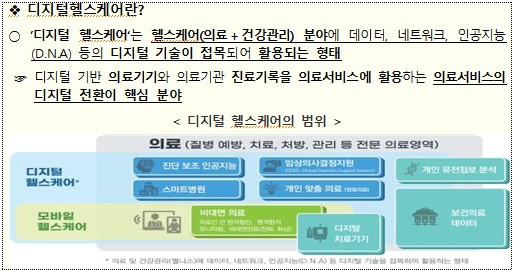
□ The current government also put digital health care at the forefront of national tasks for the first time in the government.
<National Task 25. Leaping to a global center for bio/digital health>
○ (Digital Health) Build a 'Health Information Expressway' system that allows individuals to easily utilize their own medical and health information, and provide customized services
– Establishment of legal and institutional basis for medical my data and digital health care services
○ (Big Data) Expand data-based R&D, such as building and opening big data for health care, and developing artificial intelligence using bio-digital data, and promote precision medicine
□ In the future, MW aims to promote public health using digital technology,
○ We plan to actively pursue three policy directions: ① realization of digital-based future medical care, ② creation of a new digital health care market, and ③ innovation of the bio-health industry based on big data.
○ In addition, the foundation for supporting the digital healthcare innovation ecosystem, such as establishing a close public-private cooperative system and enacting a new digital healthcare and health data data law, will be strengthened.
□ With the establishment of the 'Digital Healthcare Policy Direction', MW plans to discover additional policy tasks by collecting opinions from stakeholders (medical industry, industry, patient groups, etc.) and related ministries, and conducting research services.
< Clinical Data Network (K-CURE) Project Promotion Plan >
□ The Ministry of Health & Welfare announced the Clinical Data Network (K-CURE*) Promotion Plan ('1~'22) to create a foundation for research on various and in-depth diseases to overcome cancer, the number one cause of death in Korea. did.
□ The Ministry of Health & Welfare provides researchers with cloud-based integration and linkage of cancer data scattered across private medical institutions such as medical data-oriented hospitals and public institutions such as Statistics Korea, National Cancer Center, National Health Insurance Corporation, and Health Insurance Review and Assessment Service. do.
○ A total of 40 medical institutions, including medical data-centric hospitals, build standardized cancer clinical libraries according to national cancer registration statistics and medical institution demand, and open metadata through the K-CURE portal.
– Specifically, by operating a data standardization, quality control, construction and utilization division composed of experts in the field of clinicians and medical informatization, a standard definition of items with high research use value was developed, and 10 major cancer types* were phased out by 2025. to expand the cancer clinical library.
* ('22.) Stomach cancer, breast cancer/ ('23) Colon cancer, liver cancer ('24) Pancreatic cancer, lung cancer, prostate cancer / ('25) Cervical cancer, kidney cancer, blood cancer
○ The National Cancer Data Center collects information on national check-ups, claims, and causes of death from a total of 450 million cancer-registered patients in accordance with the Cancer Control Act, and builds a public library for managing full-cycle history that combines them based on resident registration numbers.
– To this end, public institutions participating in the K-CURE project signed an “MOU between public institutions for cooperation in establishing the K-CURE clinical data network” to promote cooperation for a virtuous cycle of using public cancer data.
* ('22.6.27 (Mon), Korea Chamber of Commerce and Industry) Ministry of Health & Welfare, Statistics Korea, National Health Insurance Corporation, Health Insurance Review and Assessment Service, National Cancer Center, Korea Health and Medical Information Service
○ In addition, it is planned to designate a medical data safe utilization center through an open call for integrated use of clinical data from medical institutions, various data held by public institutions, and death information combination service*.
* By simplifying the procedure for combining clinical information from medical institutions and Statistics Korea, combined clinical and cause of death information is provided to the safe utilization center where researchers want to analyze the data.
– In the second half of this year, one central center and two regional centers will be opened, and standards for the installation and operation of medical data safe utilization centers will be established, and the secure utilization center designation system will be introduced in earnest from '1.
* Central Center (operated by the K-CURE Secretariat), Regional Center (community and selection in 22, pilot operation) / Introduction of designation system (from '23)
□ In the future, as a leading model for combining and utilizing cancer data, we plan to gradually expand the clinical data network targeting Korean-specific diseases, such as cardiovascular and respiratory diseases, in addition to existing cancers.
< Direction of Medical My Data Policy >
□Under the grand principle of personal information protection, a new management system plan was discussed according to the creation of the medical MyData platform ecosystem.
○ Medical My Data refers to an ecosystem that enables digital transmission so that each citizen can ▴ easily inquire and check his or her medical data through mobile apps, and ▴ use it wherever and for the desired purpose.
– Through this, ① support for people’s daily health care, ② reinforcement of personalized treatment for individuals and families ③ digitalization of hospital administrative tasks such as issuance of various existing documents, ④ creation of a new digital health care market, etc. will drive change.
-Participants agree on the need to establish a new management system for safe use of their medical data as the scope of use of their medical data expands,
– In the process of establishing an ecosystem, the wise division of roles between the private and public sectors was especially emphasized, which does not impede the private sector's will to develop creative services.
□ Lee Ki-il, 2nd Vice Minister of Health & Welfare of the Ministry of Health & Welfare, said in a remark by both committees, “Our department is committed to improving the quality of medical care and promoting public health by spreading digital health care services based on health data and artificial intelligence. We will continue our efforts.”
○ “I asked all experts to gather their wisdom so that we can promote policies for revitalizing digital health care and creating sensible results through the safe use of health and medical data.”
<Attachment> 1. Overview of the 1st Health and Medical Data Policy Review Committee2. List of members of the Health and Medical Data Policy Review Committee
3. Digital Healthcare Policy Vision
4. Clinical data network (K-CURE) business plan
5. Medical My Data Policy Main Directions
Attachment 1
Overview of the 1st Health and Medical Data Policy Review Committee
□ Overview
○ (Purpose) Discussing major issues related to medical information and health data policy implementation
○ (Date/Location) '22. 6. 27.(Mon) 14:30~15:35, Korea Chamber of Commerce and Industry 11th floor, Korea Health and Medical Information Service Conference Room
○ (Participation) 2nd Vice Minister of Health & Welfare (Chairman), Director of Health Industry Policy Bureau, 20 members of each field including government and public institutions, organizations and experts
□ Agenda for discussion
① Digital healthcare policy direction
② Clinical data network (K-CURE) business plan
③ Medical My Data Policy Promotion Direction
□ Detailed progress plan
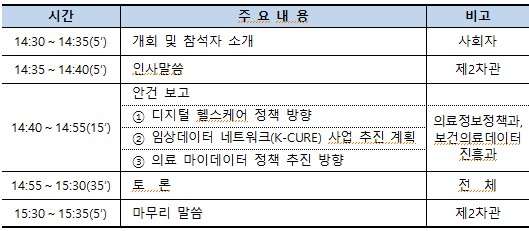
Attachment 2
List of members of the Health and Medical Data Policy Review Committee
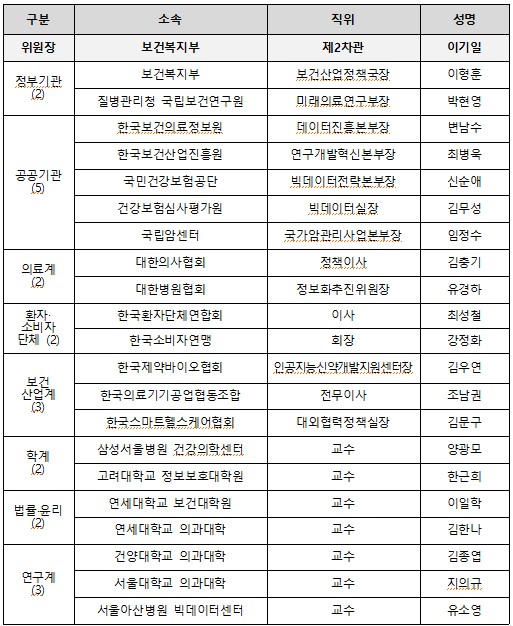
Attachment 3
Digital Healthcare Policy Vision
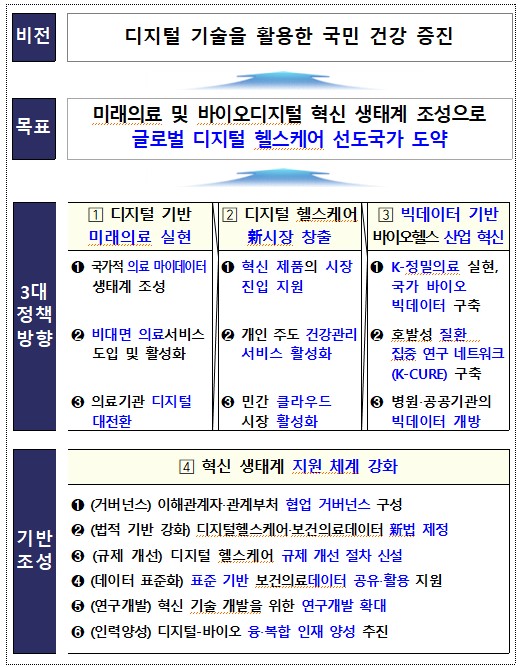
Attachment 4
Clinical data network (K-CURE) business plan
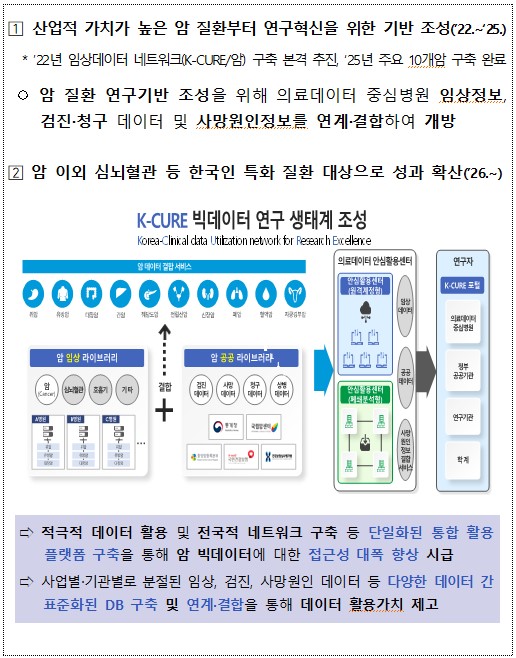
Attachment 5
Main Directions for Medical My Data Policy
